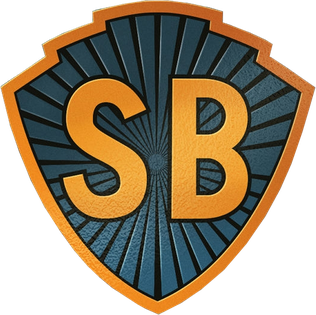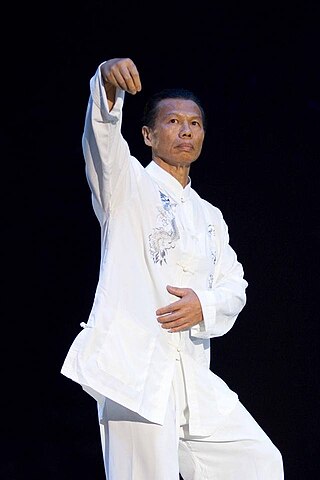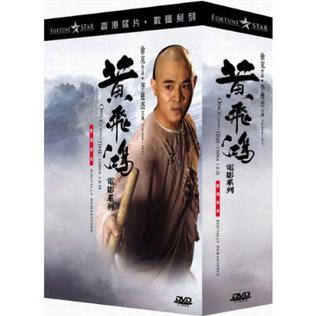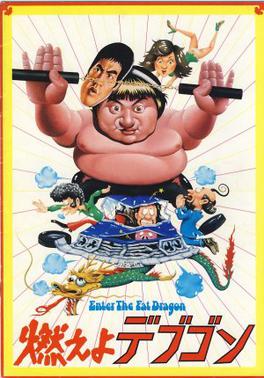
Shaw Brothers (HK) Limited was the largest film production company in Hong Kong, operating from 1925 to 2011.

The cinema of Hong Kong is one of the three major threads in the history of Chinese-language cinema, alongside the cinema of China and the cinema of Taiwan. As a former Crown colony, Hong Kong had a greater degree of political and economic freedom than mainland China and Taiwan, and developed into a filmmaking hub for the Chinese-speaking world.

Drunken Master, also known as Drunken Master The Beginning, is a 1978 Hong Kong martial arts comedy film directed by Yuen Woo-ping and produced and co-written by Ng See-yuen. The film features much of the same crew as Yuen's Snake in the Eagle's Shadow released earlier the same year, including lead actors Jackie Chan, Yuen Siu-tien, and Hwang Jang-lee; although narratively unrelated, Drunken Master bears similarities to its predecessor in its story and style.

Project A is a 1983 Hong Kong martial arts action comedy film starring and directed by Jackie Chan, who also wrote the screenplay with Edward Tang, who produced with Leonard Ho and Raymond Chow. The film co-stars Sammo Hung and Yuen Biao. Project A was released theatrically in Hong Kong on December 22, 1983.

Police Story is a 1985 Hong Kong action comedy film directed by and starring Jackie Chan, who co-wrote the screenplay with Edward Tang. It is the first film in the Police Story franchise. It features Chan as Hong Kong police detective "Kevin" Chan Ka-Kui, alongside Brigitte Lin and Maggie Cheung. In the film, Ka-Kui helps arrest a drug lord, but must clear his own name after being accused of murder.

Come Drink with Me is a 1966 Hong Kong wuxia film produced by Shaw Brothers Studio and directed by King Hu. Set during the Ming Dynasty, it stars Cheng Pei-pei, Yueh Hua and Chan Hung-lit in the leading roles, and features action choreography by Han Ying-chieh.

Police Story 3: Supercop, released as Supercop in the United States and also known as Jackie Chan's Supercop, is a 1992 Hong Kong action comedy film directed by Stanley Tong. It is the third installment in the Police Story series, with Jackie Chan, Maggie Cheung and Bill Tung reprising their roles from the first two films, and Michelle Yeoh introduced as a new co-lead alongside Chan.

Yeung Sze, better known as Bolo Yeung, is a Hong Kong former competitive bodybuilder, martial artist, and actor. Primarily known for playing villains in action and martial arts films, he is regarded as one of the most influential actors in martial arts cinema.

Kung Fu Hustle is a 2004 martial arts action comedy film directed, produced and co-written by Stephen Chow, who also stars in the leading role, alongside Huang Shengyi, Yuen Wah, Yuen Qiu, Danny Chan Kwok-kwan and Leung Siu-lung in prominent roles. The story revolves around a murderous neighbourhood gang, a poor village with unlikely heroes and an aspiring gangster's fierce journey to find his true self. The martial arts choreography is supervised by Yuen Woo-ping.
Hong Kong action cinema is the principal source of the Hong Kong film industry's global fame. Action films from Hong Kong have roots in Chinese and Hong Kong cultures including Chinese opera, storytelling and aesthetic traditions, which Hong Kong filmmakers combined with elements from Hollywood and Japanese cinema along with new action choreography and filmmaking techniques, to create a culturally distinctive form that went on to have wide transcultural appeal. In turn, Hollywood action films have been heavily influenced by Hong Kong genre conventions, from the 1970s onwards.

Once Upon a Time in China is a Hong Kong film and television franchise created and produced by Tsui Hark, consisting of six films and a television series released between 1991 and 1997. Tsui also directed four of the films and co-wrote the first five as well as an episode of the television series.

Fist of Legend is a 1994 Hong Kong martial arts film directed by Gordon Chan from a screenplay by Chan, Lam Kee-to and Kim Yip. It features action choreography by Yuen Woo-ping and was produced by Jet Li, who also stars in the lead role of Chen Zhen. It is a remake of the 1972 martial arts film Fist of Fury starring Bruce Lee.

Police Story 2, also known marketed as Police Story Part 2 is a 1988 Hong Kong action comedy film starring and directed by Jackie Chan, who also wrote the screenplay with Edward Tang. It is a sequel to the hit 1985 film Police Story, continuing the storyline of Chan's character "Kevin" Chan Ka-kui, and is the second installment of Police Story series. It also marks the last appearance in the series for Lam Kwok-Hung as Chief Inspector Raymond Li, Chor Yuen as Chu Tao and Charlie Cho as John Ko.
The Bloody Fists is a 1972 Hong Kong action film directed by See-Yuen Ng and starring Chen Siu Sing and Kuan Tai Chen. The memorable fight scenes were choreographed by Yuen Woo-ping, better known for choreographing Crouching Tiger, Hidden Dragon and The Matrix.

Wheels on Meals is a 1984 Hong Kong martial arts action comedy film written and directed by Sammo Hung, with action choreographed by Jackie Chan. The film stars Jackie Chan, Sammo Hung, Yuen Biao, Lola Forner, Benny Urquidez and José Sancho. The film was shot in Barcelona, Spain.

Enter the Fat Dragon is a 1978 Hong Kong martial arts film starring and directed by Sammo Hung. The film is mostly a parody of the Bruce Lee film Way of the Dragon (1972), and a satire of the Bruceploitation phenomenon of the 1970s. The title is a reference to another Bruce Lee film, Enter the Dragon (1973).
![<i>Dragon Fist</i> 1979 [[British Hong Kong|Hong Kong]] film](https://upload.wikimedia.org/wikipedia/en/7/70/Dragon_Fist_poster.jpg)
Dragon Fist is a 1979 Hong Kong martial arts film directed by Lo Wei. It stars Jackie Chan, Nora Miao, James Tien, Yen Shi-kwan, Eagle Han-ying, and Wu Wen-sau.

Fatal Contact is a 2006 Hong Kong martial arts film written and directed by Dennis Law, who also producer with Herman Yau. The film stars Wu Jing, Ronald Cheng, Miki Yeung, Theresa Fu, Cheung Siu-fai, Ken Lo, Andy On, Lam Suet and Timmy Hung. Wu Jing played Kong Ko who is trained with the fighting techniques of Sanshou martial arts, and lured into the world of illegal martial arts fighting.
Hong Kong Legends was a United Kingdom DVD distribution company, based in Hertfordshire and operating from the UK and Australia between 1999 and 2007. Hong Kong Legends was initially part of Medusa Communications, who, along with Soulblade bought up the UK distribution rights for film titles previously owned by Eastern Heroes label.

Hong Kong Cinemagic, sometimes referred to as HKCinemagic, was a bilingual website providing a repository for information about Chinese language films from Hong Kong, China and Taiwan, and the people who created them. The website contained news, interviews, film reviews and a database of people, films and film studios as well as an illustrated glossary of terms. The web magazine existed in various forms for over two decades. As of March 2009, the database contains over 10,000 films. The site was updated for the last time in December 2017.













![<i>Dragon Fist</i> 1979 [[British Hong Kong|Hong Kong]] film](https://upload.wikimedia.org/wikipedia/en/7/70/Dragon_Fist_poster.jpg)

